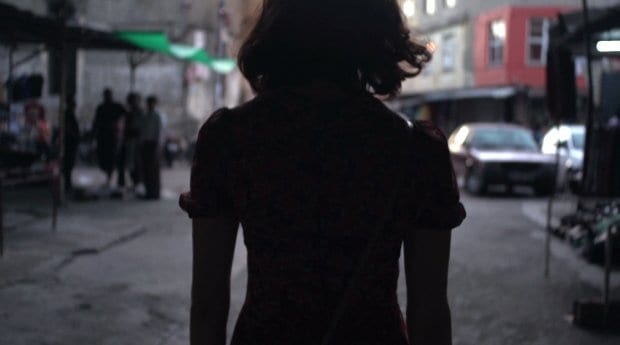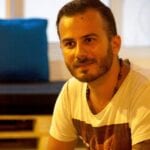Sandra Bagaria used to wake up to constant notifications from her BlackBerry; the soft pings were music to her ears. The messages, she believed, came from Amina Arraf, a Syrian lesbian in her late 20s with beautiful, short black hair and a lovely birthmark just above her left eyebrow. They spoke about love, poetry and revolutions. They shared secrets they didn’t dare to tell others.
Today, Bagaria wakes up to monitor the news coming out of the Arab world. From her home in Montreal, she spends a good hour each morning refamiliarizing herself with its ever-changing political map as she prepares for her trip to the Sundance Film Festival, where The Amina Profile, a documentary about her relationship with Amina Arraf, opens Jan 24.
“I felt that I have to share the story with someone else because it was too heavy for me to keep it for myself,” Bagaria says.
The story of Amina Arraf began quietly enough on Feb 19, 2011, when she started a blog called Gay Girl in Damascus. In it, she described herself as a woman living openly as a lesbian in Syria, sharing her thoughts on “life, the universe and so on.” For the brave women who truly were struggling to live as openly as they could without reprisal in Syria, Amina’s stories quickly rang false. Nobody had ever heard of her — unlikely in their small, tightly knit, supportive community.
When Amina posted a story about her father defending her to police who had come to arrest her, I began to ask questions. No one knew Amina. As a journalist living in Damascus at the time, I helped uncover the truth about Amina: that she didn’t exist.
Bagaria sits back in her chair as I interview her via Skype. Behind her, photos and posters hang on her fridge, among them a couple of pro-democracy slogans and a rainbow flag.
“I had to ask myself the right questions to actually be able to move forward,” she says. “I did not want to be depicted as a victim but more as a person who showed humanity to save someone else’s life.”
In June 2011, Syrian regime forces reportedly kidnapped Amina during a peaceful protest in the early days of the Syrian uprising. Bagaria raced against time and more daunting constraints to try to free her. She communicated with international forces, powerful governments and media-industry giants. But Amina Arraf, the lesbian revolutionary blogger with the sweet smile and shy demeanour, turned out to be a fake personality.
The revelation that the Gay Girl in Damascus was a hoax shocked many people around the world. It changed their perceptions of the Syrian crisis and affected the way media have covered the revolutions in the Arab world.
“The hoax raises difficult questions about the reliance on blogs, tweets, Facebook postings and other internet communications as they increasingly become a standard way to report on global events,” wrote two journalists at The Washington Post. “Information from online sources has become particularly important in coverage of the Middle East uprisings, especially in countries that severely restrict foreign media — or that use social media against protesters.”
Not surprisingly, the hoax also angered Syria’s normally quiet and cautious LGBT community, as many accused the man behind the hoax of using, and possibly harming, their cause.
Ultimately, the hoax sent Bagaria and Canadian filmmaker Sophie Deraspe on a journey from Montreal to Chicago, Istanbul and Beirut to search for the local activists, international forces and journalists who were part of the making and undoing of the hoax known as Amina Arraf.
The resulting documentary captures the struggle for freedom during a small nation’s uprising in the Middle East and examines the role and responsibilities of media in making and breaking news, even as it narrates the very personal toll taken on one Canadian woman.
“It went a lot further than what we were dreaming of. It was an online love story that became something political and psychological,” Deraspe says. “I had to figure a way to tell it in a cinematic atmosphere with my tools: the camera, the microphone.”
The hardest moment was meeting the man behind the hoax. Tom MacMaster, a straight, married, 40-year-old American man living in Scotland, was revealed to be the blog’s true author in June 2011, after people around the world responded to what turned out to be Amina’s fake kidnapping.
“We wanted to meet with the person behind Amina,” Deraspe says. “We wanted to surprise that person. This was the most challenging encounter we had.”
The fascinating documentary, whose trailer can be seen here, premieres at the Temple Theatre in Park City, Utah, as part of the Sundance Film Festival.
“I had to make sure that the viewer would experience that Amina fantasy to find a way to explore the brutal reality,” Deraspe says.
“Now that the documentary is finished, I’m very proud of the results,” Bagaria says. Maybe now, she says, she can put some distance between herself and Amina.
Watching the final edit of the movie was an emotional day for Bagaria. “I was laughing because I realized how much I got fooled,” she says, “how crazy the story looks three years after.”
When the credits rolled, she cried. “I was very emotional. I was sharing [this story] with my friends — and it was finally done.”
“At the end, I think it’s a film that speaks to all of us who are using social media as a way to interact,” Deraspe says. It’s a film that looks at people’s desire to be informed and to connect with others around the world, she says, as well as the ways in which those connections can unfold online — and who becomes responsible for what.
Produced by esperamos in conjunction with the National Film Board of Canada, The Amina Profile is expected to open in local theatres this spring.
Editor’s note: A previous version of this story misspelled director Sophie Deraspe’s name.
Ahmed Danny Ramadan appears in The Amina Profile narrating his role in uncovering the reality of Amina. To learn more about that side of the story, check out his articles in The Guardian and Foreign Policy.


 Why you can trust Xtra
Why you can trust Xtra


